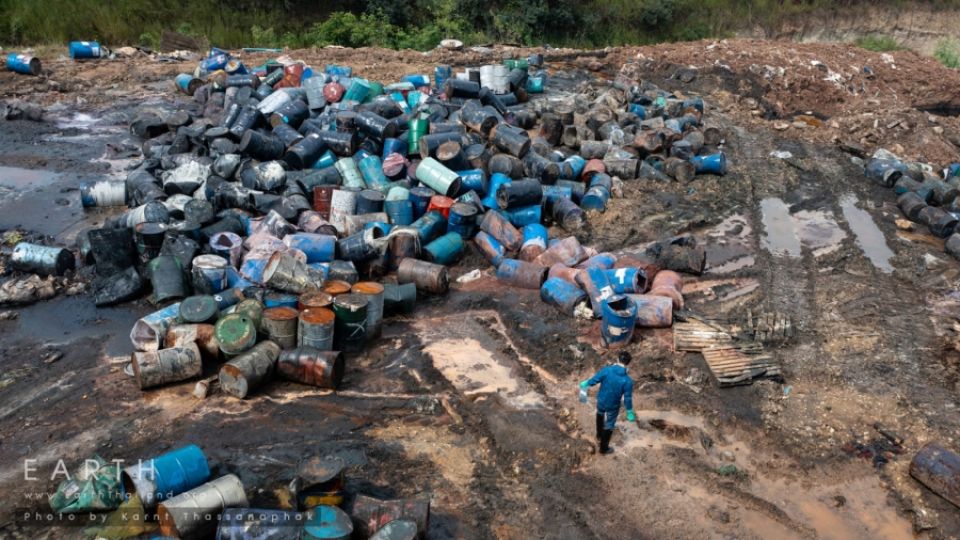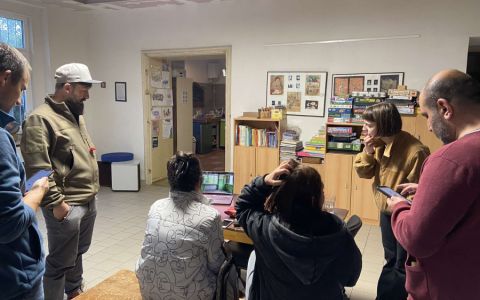Within our joint project, Arnika’s long-term partner - EARTH Thailand - is carefully monitoring the hotspots of industrial pollution and watching local cases to protect the environment and health of local communities. Unfortunately, several recent events have proved again how important for Thailand it is to introduce and effectively use the Pollutant Release and Transfer Register (PRTR).
Chemical leakage at illegal dumping sites in Lopburi
Widespread chemical leakage with VOC level reaching the highest limit of portable air detector was revealed during EARTH’s fieldwork at covert industrial waste dumping sites in Lopburi. At the first sight, the EARTH team observed a large number of squeezed 200-liter barrels, causing unknown chemicals to leak onto the ground, with various types of wastes and plastic around. The waste piles emitted a foul odor, reminding industrial waste and chemicals.
EARTH’s technical officer expressed concern that these contaminants would cause pollution of the pond and the surrounding soil. Local farmers in the area added that the smell of chemicals affected people living as far as 2 km away from the site - many locals had to temporarily move out to escape the smell. Also, people are concerned that they may not be able to continue their agricultural livelihood because of the pollution.
EARTH also investigated the second dumping site with a large pile of gravel and soil, interspersed with unidentified goopy, viscous substances. The pile was located in front of a house and next to a public waterway. EARTH will continue to observe and investigate the covert dumping situation and conduct further analysis of environmental samples from the sites.
Explosion showing how hazardous substances laws have barely improved
On July 5th, an explosion occurred at the Ming Dih Chemical factory in Samut Prakan's Bang Phli district. “The shockwave from the blast destroyed the factory and shattered the windows of houses and buildings in a two-kilometer radius. Some 40 people were injured and one firefighter was killed in an effort to extinguish the flames. Over 600 tonnes of a hazardous styrene monomer, stored in the factory, leaked into the environment, or burned in the blast, contaminating water sources and releasing a large plume of toxic air pollution into the atmosphere. People in a five-kilometer radius were evacuated,” Bangkok Post described.
A chemical reaction is thought to be the cause, but Sonthi Kotchawat, an environmental expert, said that many loopholes and weak enforcement of environmental protection and city planning laws are also factors contributing to the incident, such as storing large amounts of hazardous chemicals close to areas with the high population without having proper safety equipment in place. According to the expert, Ming Dih Chemical was also able to renew its license and expand its operation without having to do an Environmental Impact Assessment (EIA) because the factory is classified as a plastic pallets factory but not a petrochemical industry.
Penchom Saetang, director of EARTH, said the chemical explosion at the Ming Dih Chemical factory resembles the chemical storage blast at Klong Toey Port on March 2nd, 1991, which also caused severe toxic chemical contamination and extensive damage to nearby communities. “Even though some aspects of the environmental protection laws have improved since three decades ago, the explosion at Ming Dih Chemical is clear evidence that our laws and their enforcement are not good enough,” she explained. “This is why we need a PRTR law, as industries will be bound by this law to declare their movement and management of hazardous substances as well as the amount of pollution released from their factories. That will not only ensure transparency in the supply chain but also help tackle industrial pollution problems.”
Original articles:
EARTH - EARTH began initial probes at an illegal dumping site in Lopburi: https://www.earththailand.org/en/article/734
Bangkok Post - Blast sends stiff message - Hazardous substance laws have barely improved since last tragedy: https://www.bangkokpost.com/thailand/special-reports/2146775







